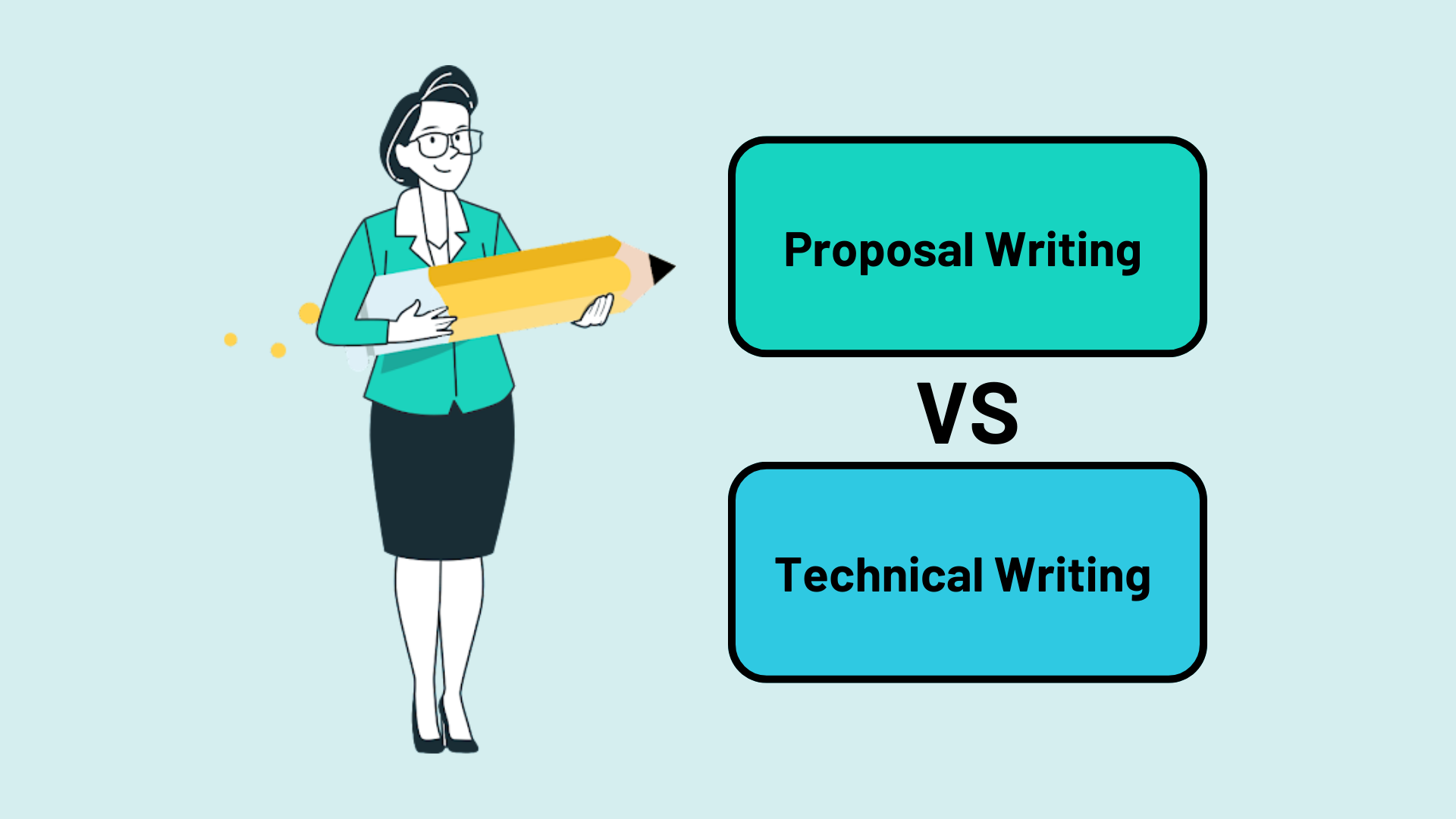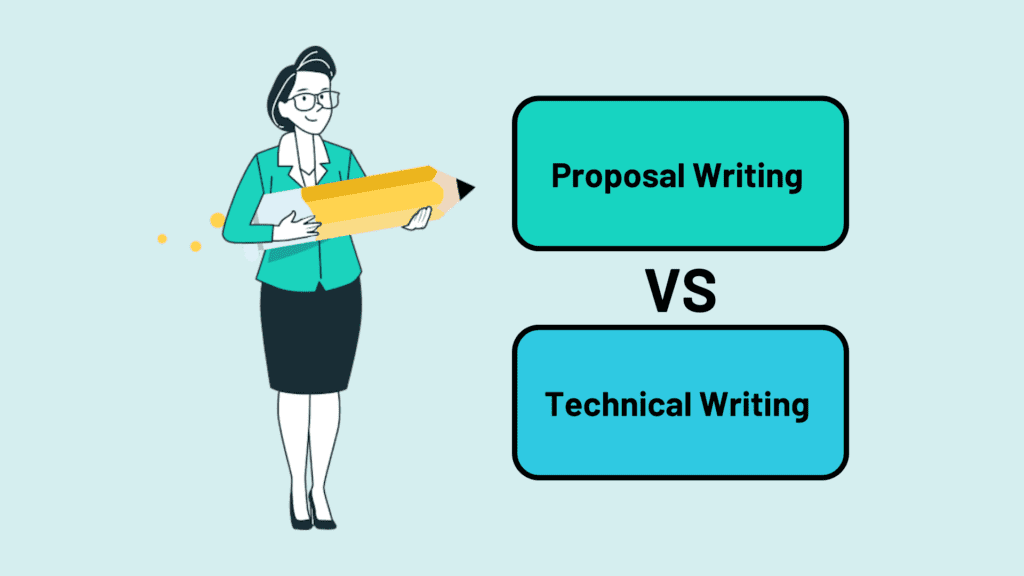How Proposal Writing Differs From Technical Writing


If you’re in a position that requires you to write regularly, you’ve probably mastered the craft of technical writing. The main characteristics of technical writing are clarity and accuracy. Its purpose is to describe, which helps people understand and execute tasks. Most of what we do in the business world on a daily basis is technical writing. But, if you write only from a technical perspective when developing your RFP, you risk simply describing instead of providing essential information that differentiates your firm. Proposal, technical, and business writing are valuable skill sets that aren’t treated with the level of importance they deserve. Here are the major differences between proposal and technical writing to help you adapt your RFP writing style!
Proposal Writing Prioritizes Context
While describing is fundamental to technical writing, it shouldn’t be your main approach when developing a business winning RFP. Okay. So, what exactly is proposal writing? Proposal writing involves putting things into context and integrating all the components in a way that builds a complete narrative. Your purpose in an RFP is to inform and persuade your audience to select you as a contractor. Align the RFP with your offerings and bid strategies. Rather than simply explaining your process, take it a step further to make it clear why that process matters. What is it that you do better than your competitors?
Your goal in the proposal is to distill the essence of your company. Describe your company as something that the offeror can easily understand. A good proposal writer will tell the offeror what they need to know to avoid overwhelming them. That’s just one more reason why you need an RFP writer.
Proposal Writers Persuade by Making a Point
Proposal writing has a persuasive component that technical writing lacks. Just like when you wrote an essay in grade school, you want to make your point with solid evidence. It’s important to position your firm as the one best placed to address the concerns that impact the evaluators’ decision. Your proposal needs to tailor the narrative to how the buyer benefits and how the proposal relates to evaluation criteria. Even better, tell the offeror exactly how you would meet every single one of their needs. If they choose your firm, you will be ready and able to enact the plan as laid out in your RFP response. Put yourself in the shoes of the offeror and think about what they would consider most important in a contractor.
Proposal Writing Balances the Level of Detail
With technical writing, the more detail you can include, the better. However, when using proposal writing in your RFP proposal, you must carefully balance your level of detail with concrete evidence of your expertise and credentials. You don’t want to overload the evaluators with information that doesn’t influence their decision.
Let’s say, for instance, that you’re choosing three references to provide in support of your proposal. Although you want to fully describe the projects you worked on, you also want to make strategic decisions. What projects have you worked on that are similar to this RFP? And, which contacts know your work well and are willing to speak to your expertise? These are the types of “big picture” questions a proposal writer would ask. Your references should be specific to the context of the RFP. Show just enough detail to showcase the best of your company’s work ethic and skills.

Proposal Writers Design Your RFP for Success
Technical writing can be more straightforward in that you, the writer, get to choose the design of your document and how it will look. In this context, you would typically follow a set of predetermined brand guidelines with specific colors and fonts.
On the other hand, writing a proposal often involves following a structure that the offeror determines for you. Although this provides a helpful outline for your response, it can feel limiting. This is especially true if you’re used to writing in a specific format. But this doesn’t mean your RFP has to be drab and devoid of personality! In proposal writing, writers know they can enhance their content with infographics, cover pages and colors. A well-designed chart with your brand colors and logo can add a memorable touch. Proposal writers often work with professional designers to help get your RFP layout exactly right so it’ll stand out. There are also plenty of enhancement tools for creating amazing RFP responses. If you put careful thought and effort into your RFP’s design, evaluators will take notice.
Knowing When to Use Technical Writing
As with most types of writing, proposal writing isn’t all-or-nothing. The beauty of RFPs is that you can include some tastefully chosen elements of technical writing. How you decide to communicate your firm’s expertise, values, and reliability is entirely up to you.
Writing with a technical style can be helpful for the sections of your RFP where you have to describe something to the offeror. For example, you might use this approach when discussing your company background or offerings. RFP questions that begin with “Describe…” are also an indicator that using technical style is appropriate for that response. Don’t limit yourself by thinking there’s only one correct way to write or edit a proposal. For example, we discuss tender writing services in a different article. In addition, we’ve also written an article to help you decide if you need bid writing services.
Often, the most difficult part of proposal writing for companies is embracing a new style of writing. The language and structure of RFPs alone can be overwhelming, let alone trying to develop an effective writing process. We sometimes fear what we don’t understand, and that extends to RFPs.
You Don’t Have to Go Through It Alone
At The Bid Lab, we seek to alleviate that fear. Our firm helps others feel comfortable and confident in their ability to gain new business. We use the best resources and expert knowledge to develop a proposal that gets you recognized. We also created Bid Banana, the user-friendly RFP search engine. So, contact us today for a free consultation. So, call us at 1-844-4BIDLAB or email respond@thebidlab.com to see how we can make your next RFP experience positive and stress-free.
